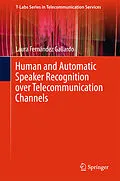This work addresses the evaluation of the human and the automatic speaker recognition performances under different channel distortions caused by bandwidth limitation, codecs, and electro-acoustic user interfaces, among other impairments. Its main contribution is the demonstration of the benefits of communication channels of extended bandwidth, together with an insight into how speaker-specific characteristics of speech are preserved through different transmissions. It provides sufficient motivation for considering speaker recognition as a criterion for the migration from narrowband to enhanced bandwidths, such as wideband and super-wideband.
Inhalt
Introduction.- Literature Review.- Human Speaker Identification Performance under Channel Degradations.- Importance of Intelligible Phonemes for Human Speaker Recognition in Different Bandwidths.- Automatic Speaker Verification Performance Under Channel Distortions.- Detecting Speaker-Discriminative Spectral Content in Wideband for Automatic Speaker Recognition.- Relations Among Speech Quality, Human Speaker Identification, and Automatic Speaker Verification. Conclusions and Future Work.
